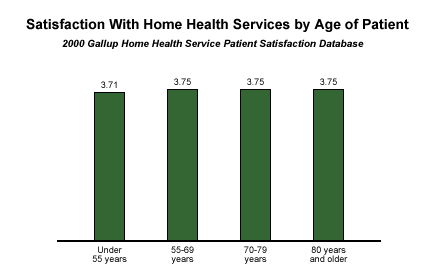In 1996, the National Center for Health Statistics figured there were 13,500 home health and hospice care agencies in the United States, serving 2.5 million home health patients. Home health agencies primarily meet elderly patients' needs -- in 1998 (the most recent year for which data are available), 69% of home healthcare patients were aged 65 or older. While home healthcare's goal is to help patients and their caregivers to become self-sufficient, many patients receive extended periods of care.
How Are Home Health Agencies Performing?
Home health agencies are at the forefront of providing healthcare services to the elderly, and as life expectancy increases, the elderly continue to comprise a larger, more varied sector of the U.S. population. A 70-year-old home health patient may have very different needs and expectations than a 90-year-old home health patient. Given that patients' needs are likely to become more challenging with age, does patient satisfaction with home healthcare services tend to change as they grow older?

According to ║┌┴¤═°'s 2000 database of satisfaction ratings with home health services, there is virtually no difference in satisfaction by age. Respondents were asked to rate the home health services they received on a scale of 1 to 4. The mean satisfaction score for respondents under age 55 was 3.71. The mean scores for respondents between the ages of 55 and 69, 70 and 79, and 80 and older were identical at 3.75.
Key Points
Overall, compared to other types of healthcare services that ║┌┴¤═° evaluates, home health achieves high levels of satisfaction. Our data indicate that home health agencies are providing services that meet the needs of elderly people of varying ages. This is a very auspicious sign, because the demand for home health services is likely to increase rapidly as the baby boomer generation ages.
